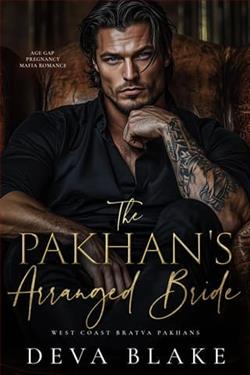Page 22 of Broken Desires
I can see the doubt on their faces. “Did he?” Poppy asks, raising an eyebrow.
I shrug again—they don’t see it, his wild streak, of course they don’t. Why would they? It’s so well cultured, his stoic British reserve, and yet from the moment his eyes met mine, I knew.
“He said that in Europe, you can drink at eighteen. It only took one blow job,” I say once I have everything on the counter to prepare the most explosive margaritas known to mankind.
But I can’t keep a straight face at the shock on my friends’ faces and start laughing.
“God, you’re so gullible! It’s wishful thinking.” And it truly is because I’m not even sure why, but this man exudes so much masculinity and raw power that I’m certain I would not mind getting on my knees for him.
I fill three glasses to the edge and bring them to the coffee table before getting the half-full glass mixer jug to put beside the glasses. I know we’ll need a good dose of alcohol to get through our secrets without breaking down.
We each grab a glass, and I take a deep breath. “To baring a smidgen of our souls, in the name of better protecting each other.”
Poppy clears her throat. “You didn’t skimp on the tequila.”
I wink, trying to lighten the mood. “I figured some of us might need a bit more liquid courage than others to open up.”
The room falls into a contemplative silence, punctuated only by the soft clinking of glasses and hesitant sips. I know I should start being as I’m the one who suggested this.
You’re brave, Vanessa Caldwell, I think as I finish my glass in one go. “Alright, I’ll kick things off. Bet you didn’t know you’ve been living with a deaf girl, did you?”
Their reactions are exactly what I had hoped for. Surprise but no pity or anger. I was ready to defend my reasons for keeping it a secret. But their immediate acceptance is a relief. I should have given more credit to my girls.
“You’re deaf? But…” Poppy gestures toward the headphones around my neck.
“The headphones?” I nod. “They’re a bit of a safety net, I suppose. They help me blend in, avoid the pitying looks and awkward conversations.”
“But how—” Eva begins, then stops herself, biting her lip in hesitation. I decide to help her out.
“How do I manage to pretend? How do I speak so well?” I ask, answering the unspoken questions.
Her cheeks turn a light shade of pink. “Yeah.”
I wave my hand dismissively despite the pain of the memory. “I lost my hearing at fourteen. It was a tough pill to swallow, and it changed my life in ways you probably can’t imagine. But I learned to adapt, to find new ways to communicate and connect with the world around me. Meningitis led to an infection, which spread to the cochlea. I’m not ashamed, but I hide it because I don’t want to be defined by it. I don’t want to be the poor deaf girl. It’s not who I am.” Well, that’s not who I am anymore. I wallowed in self-pity for a while, blaming myself for the infection even if, logically, I had no power to stop what happened. I also can’t forget the lack of support from my family during that time, and it stings. Instead of understanding, I faced resentment and blame.
“You’re not that to us,” Poppy says, drawing me into a hug that feels like a warm embrace of acceptance. “You’re Nessa, our roommate, our friend, badass extraordinaire, and master hexer.”
I smile, and it’s a real one, as I lean against her with a little sigh. I can’t help but wonder what would have happened then if I had the kind of support my new family was giving me. And somehow, I know that I probably wouldn’t have done half the shit I did.
“I know. But after losing my hearing, I spiraled, got drunk, stole a car at my sister’s wedding, earned myself a DUI, and, well, here I am. But!” I say it with a cheery tone. I don’t want them to feel bad—it’s behind me now, and truth be told, I don’t think I deserve compassion for this. I did all these things. “In four months, I can drive again.” I take a long sip and lean back in my seat. “Who’s next?” I’m exhausted to have said all of this. Sharing is really taxing for the soul, but I’m sure that now, with this big untold story out in the open, things will be even easier between us.
“Okay, my turn,” Eva says, refilling her glass with a bit more resolve in her eyes. “I owe you guys at least this much after the meltdown you witnessed.”
Every word she shares about her past, about the violinist dream that slipped through her fingers, resonates with me more than I expected. It’s not just her story that grips me; it’s the raw emotion behind it, the shared understanding of having our dreams derailed. It makes me want to open up more about my own dark days, the times when frustration and anger led me to make choices I’m not proud of. But I hold back, realizing this moment is about connection, not confession.
Hearing her out, I realize it’s not just about the music or any specific dream. It’s about hitting a wall so hard you’re not sure you can ever get past it. And yet, here we are, doing just that together. It’s a reminder that these aren’t just the girls I share a space with; they’re the ones who get it, who get me, without needing to spell everything out.
She wraps up her story, and Poppy tells hers. How Ethan’s father caused her family to sink from rich to absolute poverty. There’s this unspoken agreement hanging in the air—we’ve all had our backs against the wall, feeling lost, but we didn’t stay down. It’s kind of a silent pact among us now. We’re here for the long haul, not just to share laughs and late-night snack runs but to pull each other through the mess when it gets too much.
It’s funny how it takes a breakdown or a confession like ours to see the real strength of our bond. We’re more than just friends or roommates; we’re like this tight-knit squad forged by our battles, ready to face whatever comes next because we know we’re not doing it alone.
After last night’s raw confessions, hitting the dance studio again felt like stitching back a part of myself I thought was lost. Knowing Eva and Poppy had their own battles, that they didn’t just stumble but crashed and burned at times, weirdly comforted me. It’s like we’re all members of the same messed-up club, united by our scars. So here I am, swapping the tight confines of my little black dress for the freedom of yoga pants and a sports bra, ready to face the music—or the lack thereof—in my own way.
Part of me is angry at myself for just walking away from this part that mattered so much to me. After Eva and Poppy told their stories, it somehow put my own decisions into perspective. Dance has always been a challenge; I was too tall, too everything, and I still persevered. I never should have let the new obstacle of my deafness and my parents’ lack of encouragement and demeaning behavior get the best of me.
In the solitude of the studio, I stand before the mirror, hands gripping the barre as if it’s the only thing keeping me grounded. The girl looking back at me is fierce, a spark in her eyes that isn’t just for show this time. It’s genuine, fueled by a cocktail of defiance and a newfound sense of belonging.
I ease my leg onto the barre, stretching through the pain. It’s a sharp reminder of what I’ve missed, a bittersweet jab that says, “You idiot, why’d you ever stop?” My reflection doesn’t change much, but the intensity in my eyes tells a new story. This isn’t about reclaiming a lost dream or proving anything to my deaf ears or anyone else’s. It’s about reclaiming me.















